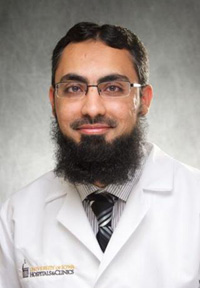Sept. 18, 2019:
Muhammad Furqan, MD, a medical oncologist and clinical associate professor of internal medicine – Hematology, Oncology and Blood and Marrow Transplantation at the University of Iowa Carver College of Medicine, will represent the university on the Big Ten Cancer Research Consortium (Big Ten CRC) Steering Committee.
As a collaboration of Big Ten universities, the Big Ten CRC leverages the scientific and clinical expertise of its members by developing and conducting early-phase oncology clinical trials that can provide access to novel treatments to patients with cancer.
 Dr. Furqan specializes in lung cancer and leads the thoracic multidisciplinary oncology group at the University of Iowa Holden Comprehensive Cancer Center. This group includes physicians and researchers from various disciplines who work collaboratively to enhance patient care and science. Since Dr. Furqan joined the university in 2014, he has been involved in many working groups to advance oncology research and has witnessed many advancements, including the broad use of immunotherapy and targeted therapies. Dr. Furqan also supervises clinical services at the Holden Comprehensive Cancer Center as medical director.
Dr. Furqan specializes in lung cancer and leads the thoracic multidisciplinary oncology group at the University of Iowa Holden Comprehensive Cancer Center. This group includes physicians and researchers from various disciplines who work collaboratively to enhance patient care and science. Since Dr. Furqan joined the university in 2014, he has been involved in many working groups to advance oncology research and has witnessed many advancements, including the broad use of immunotherapy and targeted therapies. Dr. Furqan also supervises clinical services at the Holden Comprehensive Cancer Center as medical director.
In the years ahead, he along with other researchers in the Big Ten CRC hope to implement more effective ways to conduct and complete clinical trials.
“I would like the Big Ten CRC Steering Committee to learn from each sites’ experiences, in terms of how processes are at one center compared to others,” Dr. Furqan said. “I also want to identify common challenges and areas of improvement. Learning those things is key for each site to improve its operation in clinical research and advance the work of the Big Ten Cancer Research Consortium.”
He would also like to see the Big Ten CRC use its collective expertise to give certain drugs an opportunity to be explored in clinical settings.
“Sometimes the importance of a drug is underestimated while it could be very effective in a selected patient population,” Dr. Furqan said. “The investigators in the Big Ten CRC who have both clinical and scientific knowledge in those particular areas could come up with unique studies to evaluate various drugs. I think the Big Ten CRC is a very efficient platform to do early phase studies and could investigate newer compounds quickly in multiple settings.”
Dr. Furqan received his medical degree from Dow Medical College in Karachi, Pakistan, and completed his residency in internal medicine at Seton Hall University in South Orange, N.J. He then completed his fellowship in hematology-oncology at New York Medical College in Valhalla, N.Y.
University of Iowa Holden Comprehensive Cancer Center is Iowa’s only NCI-designated comprehensive cancer center and has held that designation since 2000. Nearly 1,200 staff and cancer center members, including faculty from 41 academic departments, collaborate to drive Holden’s research, education, and patient-care missions. Holden is the recipient of two NCI Specialized Program of Research Excellence (SPORE) grants, including the first and only neuroendocrine tumor SPORE.
In addition to its affiliation with the Big Ten CRC, Holden collaborates with other cancer centers on clinical and translational research, including the National Clinical Trials Network and the Oncology Research Information Exchange Network (ORIEN).
Dr. Furqan said he is looking forward to working with other Big Ten CRC members and seeing how they can best leverage their clinical and research expertise, to perform at a greater level across multiple sites, and open studies to accrual faster.
“We can learn from each other,” Dr. Furqan said. “I think the Big Ten CRC is a very efficient platform for investigators to bring their ideas to the committee, test their hypothesis through clinical trials, and quickly advance the bench-work to the clinic.”
About the Big Ten Cancer Research Consortium: The Big Ten Cancer Research Consortium was created in 2013 to transform the conduct of cancer research through collaborative, hypothesis-driven, highly translational oncology trials that leverage the scientific and clinical expertise of Big Ten universities. The goal of the Big Ten Cancer Research Consortium is to create a unique team-research culture to drive science rapidly from ideas to new approaches to cancer treatment. Within this innovative environment, today’s research leaders collaborate with and mentor the research leaders of tomorrow with the unified goal of improving the lives of all patients with cancer.
About the Big Ten Conference: The Big Ten Conference is an association of world-class universities whose member institutions share a common mission of research, graduate, professional and undergraduate teaching and public service. Founded in 1896, the Big Ten has sustained a comprehensive set of shared practices and policies that enforce the priority of academics in the lives of students competing in intercollegiate athletics and emphasize the values of integrity, fairness and competitiveness. The broad-based programs of the 14 Big Ten institutions will provide over $200 million in direct financial support to almost 9,500 students for more than 11,000 participation opportunities on 350 teams in 42 different sports. The Big Ten sponsors 28 official conference sports, 14 for men and 14 for women, including the addition of men’s ice hockey and men’s and women’s lacrosse since 2013. For more information, visit www.bigten.org.














Subscribe to the Big Ten CRC Newsletter X
X Facebook
Facebook YouTube
YouTube